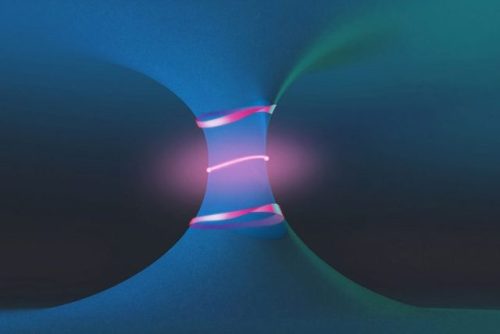Redplanet44 - Untitled
More Posts from Redplanet44 and Others
Imagine the lightsabers from this

Scientists Observe New Exotic Phenomena in Photonic Crystals
Topological effects, such as those found in crystals whose surfaces conduct electricity while their bulk does not, have been an exciting topic of physics research in recent years and were the subject of the 2016 Nobel Prize in physics. Now, a team of researchers at MIT and elsewhere has found novel topological phenomena in a different class of systems — open systems, where energy or material can enter or be emitted, as opposed to closed systems with no such exchange with the outside.
This could open up some new realms of basic physics research, the team says, and might ultimately lead to new kinds of lasers and other technologies.
The results are being reported this week in the journal Science, in a paper by recent MIT graduate Hengyun “Harry” Zhou, MIT visiting scholar Chao Peng (a professor at Peking University), MIT graduate student Yoseob Yoon, recent MIT graduates Bo Zhen and Chia Wei Hsu, MIT Professor Marin Soljačić, the Francis Wright Davis Professor of Physics John Joannopoulos, the Haslam and Dewey Professor of Chemistry Keith Nelson, and the Lawrence C. and Sarah W. Biedenharn Career Development Assistant Professor Liang Fu.
Read more.

““One of the holy grails of biomaterials research has been working out a way to get skin to grow onto and attach to metals and plastics without the risk of infection. It looks like this design and technique may have solved the problem,” says Dr Stynes, who is researching his PhD at the University of Melbourne. “It could pave the way for fully implantable robotics, prosthetics, catheters, intravenous lines, and the reconstruction of surgical defects with artificial materials.” Professor Richard Page, Director of Orthopaedics and the Centre of Orthopaedic Research and Education at Barwon Health and Deakin University, said the ability of the scaffold to make the skin think it was growing on other skin is potentially a major finding.”
— Breaking the Skin Barrier Can Lead to Breakthroughs in Robotics to Human Interface
Tumour Markers
Chemical biomarkers that can be elevated by the presence of one or more types of cancer, produced directly by the tumour or by non-tumour cells as a response to the presence of a tumour. Really great tests as can use just blood/urine, but aren’t the most specific and false positives do occur.

Alpha-fetoprotein (AFP)
Glycoprotein synthesised in yolk sac, the foetal liver, and gut - will be high in a foetus and during pregnancy.
<10 ng/mL is normal for adults
>500 ng/mL could indicate liver tumour
Normally:
Produced primarily by the liver in a developing foetus
Thought to be a foetal form of albumin
suppress lymphocyte activation and antibody production in adults (immune suppressant)
Binds bilirubin, fatty acids, hormones and metals
In cancer:
Detects hepatocarcinoma (liver cancer)
Risk factors: haemochromotosis, hep B, alcoholism - cell repair and growth from this damage leads to cancers
Present in non-pathogenic liver proliferation, including the growth and repair response to the above. This makes it hard to differentiate - AFP levels can be raised in patients with liver cancer risk factors due to the factors themselves, not a cancer. Not very diagnostic!! Used in combination with other tests/factors. Sensitivity and specificity ~75%
Other hepatocellular carcinoma markers:
γGT (γ-glutamyltransferase) - biliary damage
AFP mRNA (not always together with AFP! Might not be activated)
γGT mRNA elevated
Raised cytokines (IL-8, VEGF, TGF-B1)
ALT and AST elevated - liver disease
Carcinoembryonic antigen (CEA)
a set of highly related glycoproteins involved in cell adhesion. Potentially associated with innate immune system.
Normally:
produced in gastrointestinal tissue during foetal development
production stops before birth
present only at very low levels in the blood of healthy adults.
Cancer:
Elevated in almost all patients with colorectal cancer
Can monitor recurrence of cancer (when compared to previous test results for that patient) with a sensitivity of 80% and specificity of 70%
levels may also be raised in gastric, pancreatic, lung, breast and medullary thyroid carcinomas
also some non-neoplastic (not cancer) conditions like ulcerative colitis, liver disease, pancreatitis, COPD, Crohn’s disease, hypothyroidism - again, high risk groups for colorectal cancer - not a diagnostic test
Levels elevated in smokers.
Carbohydrate antigens (CA)
Including:
CA 19-9 - Pancreas
CA 15-3 Breast
CA 50 - Colorectal
CA 125 - ovarian
Levels rise only in disease states and particularly cancer, but will not rise in all patients.
Part 2 coming soon!
PINning down future problems

Study finds hackers could use brainwaves to steal passwords
Researchers at the University of Alabama at Birmingham suggest that brainwave-sensing headsets, also known as EEG or electroencephalograph headsets, need better security after a study reveals hackers could guess a user’s passwords by monitoring their brainwaves.
EEG headsets are advertised as allowing users to use only their brains to control robotic toys and video games specifically developed to be played with an EEG headset. There are only a handful on the market, and they range in price from $150 to $800.
Nitesh Saxena, Ph.D., associate professor in the UAB College of Arts and Sciences Department of Computer and Information Sciences, and Ph.D. student Ajaya Neupane and former master’s student Md Lutfor Rahman, found that a person who paused a video game and logged into a bank account while wearing an EEG headset was at risk for having their passwords or other sensitive data stolen by a malicious software program.
“These emerging devices open immense opportunities for everyday users,” Saxena said. “However, they could also raise significant security and privacy threats as companies work to develop even more advanced brain-computer interface technology.”
Saxena and his team used one EEG headset currently available to consumers online and one clinical-grade headset used for scientific research to demonstrate how easily a malicious software program could passively eavesdrop on a user’s brainwaves. While typing, a user’s inputs correspond with their visual processing, as well as hand, eye and head muscle movements. All these movements are captured by EEG headsets. The team asked 12 people to type a series of randomly generated PINs and passwords into a text box as if they were logging into an online account while wearing an EEG headset, in order for the software to train itself on the user’s typing and the corresponding brainwave.
“In a real-world attack, a hacker could facilitate the training step required for the malicious program to be most accurate, by requesting that the user enter a predefined set of numbers in order to restart the game after pausing it to take a break, similar to the way CAPTCHA is used to verify users when logging onto websites,” Saxena said.
The team found that, after a user entered 200 characters, algorithms within the malicious software program could make educated guesses about new characters the user entered by monitoring the EEG data recorded. The algorithm was able to shorten the odds of a hacker’s guessing a four-digit numerical PIN from one in 10,000 to one in 20 and increased the chance of guessing a six-letter password from about 500,000 to roughly one in 500.
EEG has been used in the medical field for more than half a century as a noninvasive method for recording electrical activity in the brain. Electrodes are placed on the surface of the scalp to detect brain waves. An EEG machine then amplifies the signals and records them in a wave pattern on graph paper or a computer. EEG can be combined with a brain-computer interface to allow a person to control external devices. This technology was once highly expensive and used mostly for scientific research, like the production of neuroprosthetic applications to help disabled patients control prosthetic limbs by thinking about the movements. However, it is now being marketed to consumers in the form of a wireless headset and is becoming popular in the gaming and entertainment industries.
“Given the growing popularity of EEG headsets and the variety of ways in which they could be used, it is inevitable that they will become part of our daily lives, including while using other devices,” Saxena said. “It is important to analyze the potential security and privacy risks associated with this emerging technology to raise users’ awareness of the risks and develop viable solutions to malicious attacks.”
One potential solution proposed by Saxena and his team is the insertion of noise anytime a user types a password or PIN while wearing an EEG headset.

Take My Number
The perfect news in EVERY WAY.




I have nothing to do with this mission, but damn do I feel proud. What peculiar beings we, humans, are. Sending into space a doll in a spacesuit, named “Starman”, seated in an electric car, with a sign “Don’t Panic” on the car’s dashboard, blasting David Bowie’s “Life On Mars?”. I’m not crying, you are.
Hey ISS, I'm looking at you!
![How To Identify That Light In The Sky [750 × 702] Visit Http://spaceviewsandbeyond.blogspot.com/2017/09/how-to-identify-that-light-in-sky-750.html](https://64.media.tumblr.com/05baaab06b7833133047b40e82461e65/tumblr_owry6wNqxo1w094hwo1_500.jpg)
How to Identify that Light in the Sky [750 × 702] Visit http://spaceviewsandbeyond.blogspot.com/2017/09/how-to-identify-that-light-in-sky-750.html for more space pics
Science gets one horsepower fast

It was one of the very first motion pictures ever made: a galloping mare filmed in 1878 by the British photographer Eadweard Muybridge, who was trying to learn whether horses in motion ever become truly airborne.
More than a century later, that clip has rejoined the cutting edge. It is now the first movie ever to be encoded in the DNA of a living cell, where it can be retrieved at will and multiplied indefinitely as the host divides and grows.
The advance, reported on Wednesday in the journal Nature by researchers at Harvard Medical School, is the latest and perhaps most astonishing example of the genome’s potential as a vast storage device.
Continue Reading.
Food for thought
We might won`t need a last supper yet
-
 coulsonisbetterthanyou reblogged this · 6 years ago
coulsonisbetterthanyou reblogged this · 6 years ago -
 pinkprogram reblogged this · 6 years ago
pinkprogram reblogged this · 6 years ago -
 pinkprogram liked this · 6 years ago
pinkprogram liked this · 6 years ago -
 space--bot liked this · 7 years ago
space--bot liked this · 7 years ago -
 swpeternguyen liked this · 7 years ago
swpeternguyen liked this · 7 years ago -
 lostandforgotten liked this · 7 years ago
lostandforgotten liked this · 7 years ago -
 trajectorym liked this · 7 years ago
trajectorym liked this · 7 years ago -
 babywizardwolf-665e0b47-blog reblogged this · 7 years ago
babywizardwolf-665e0b47-blog reblogged this · 7 years ago -
 babywizardwolf-665e0b47-blog liked this · 7 years ago
babywizardwolf-665e0b47-blog liked this · 7 years ago -
 zafarmanzoor liked this · 7 years ago
zafarmanzoor liked this · 7 years ago -
 karkura liked this · 7 years ago
karkura liked this · 7 years ago -
 mcm-curiosity liked this · 7 years ago
mcm-curiosity liked this · 7 years ago -
 redplanet44 reblogged this · 7 years ago
redplanet44 reblogged this · 7 years ago -
 scrumptiousmusicwombat liked this · 7 years ago
scrumptiousmusicwombat liked this · 7 years ago -
 forbes reblogged this · 7 years ago
forbes reblogged this · 7 years ago
